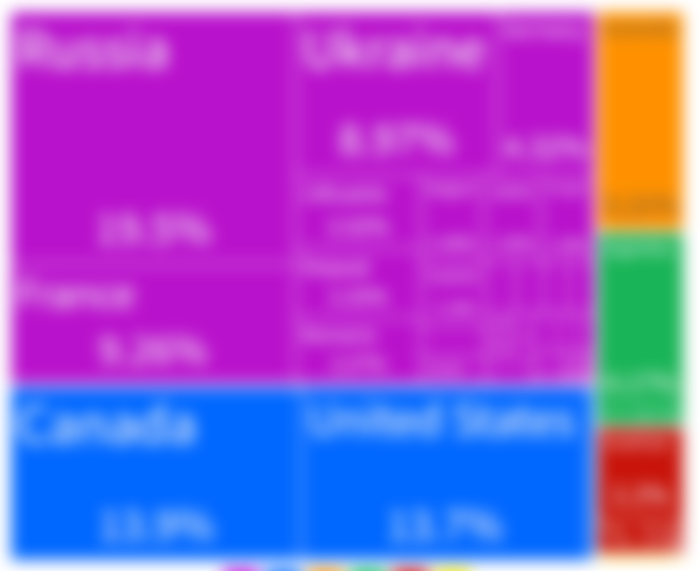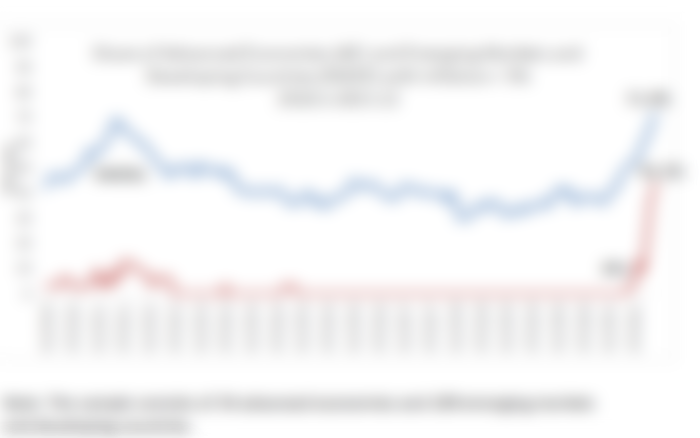Putin's invasion of Ukraine is causing a worldwide food crisis

When thinking about the Russian-Ukraine crisis, it's only natural to focus on the horrifying situation on the ground. The death, the destruction, and the demolition of communities. Those things are vitally important, but their impact extends outside these population centres. The war is also taking a toll on farming in Russia and Ukraine, something that's crucial considering how much of the world's food comes from this region.
To understand this story, you'll need to understand that both Ukraine and Russia produce a lot of agricultural commodities. Russia and Ukraine have the third and tenth most agricultural land, respectively, and together they account for 12% of all exported calories globally. If you take a look at the staple crops that form the basis of most modern food kinds of stuff, you get a sense of how important Russia and Ukraine are to the global agricultural system. Together, Russia and Ukraine account for 31% of all Bali exports. 26% of all wheat exports, 10% of all corn exports, 24% of rapeseed exports, and 32% of all sunflower seed exports.

Worlds top Wheat exporters, oecd
The war has interrupted crop production in Ukraine, with agricultural facilities being damaged by bombing and many farmers either fleeing or joining the army. And, as such, exporting crops has become more and more difficult. Early estimates suggest that this year's harvest will be down by about 30 percent, and if the war continues, Ukrainians will be unable to plant new crops in the spring, which will mean an even smaller harvest next year. Russia's agricultural exports have also suffered. While Russian agriculture isn't technically sanctioned, banks have been reluctant to lend money to Russian businesses generally, which has also limited their export capacity. Russian farmers have also struggled to get their hands on necessary imports like agricultural technology and fertilizer. Both because of sanctions, but also because the ruble is pretty weak at the moment, which has made imports significantly more expensive.
While Russia obviously won't be as badly affected as Ukraine, a lower than average harvest is still expected. A lower than average harvest in both Ukraine and Russia will directly affect countries in northwest Africa and Central Asia. Some of them rely on Russia and Ukraine for up to half of their imported calories. Egypt, the world's largest wheat importer, imports roughly 80% of its wheat from Russia and Ukraine, and there are reports that bread prices have already risen by 50% within the country. You get the idea that the direct consequence of war is a reduced harvest in both Russia and Ukraine, which accounts for a significant amount of the world's agricultural exports. But what does this mean for the wider global food markets?

Top Wheat importers, oecd
Well, it means higher prices for those things that Ukraine and Russia usually export. Just look at the prices of the crops we mentioned earlier. Wheat futures have jumped 50% since Russia's invasion, maize is up by 15% and rapeseed by 70%. But the war won't just affect crops produced in Ukraine and Russia. These higher crop prices also mean higher animal feed prices and therefore higher meat prices. But perhaps most importantly, sanctions on Belarus and Russia will push up the price of potash and therefore the price of fertilizer. Most countries, including big agricultural exporters, don't produce their fertilizer and instead rely on the global supply market. A massive 80% of all potash produced is exported to another country, and the price of fertilizer was already quite high before the war. In The UK, for example, prices have essentially doubled.
And this was in part because of ammonia. Another key ingredient in fertilizer, which is made by using natural gas, has also been pretty high recently. This is one of the scary consequences of an interconnected economic system. High prices at one price can push up prices across the board. According to reports, fertilizer prices are now at about a thousand pounds per ton, which is about triple what they were a year ago, and this will affect food prices everywhere. Look at Brazil, for example. Brazil is a massive player in global agriculture. It's the largest exporter of coffee, soybeans, pork, chicken and beef in the world. Brazil imports the majority of its fertilizer and gets about half of its potash from Belarus and Russia. Sanctions and self-imposed restrictions hinder Russian and Belarusian exports, and the price of these staple Brazilian exports will increase dramatically.

So you get the point. The war will push up food prices across the board, and if this wasn't bad enough, it's made worse by the fact that food prices were already at historic highs. According to the UN's food price index, prices were about 8% higher in January 2021 than in January 2020, and 38% higher than in 2020. Price hikes have pushed up global food insecurity, which jumped during the pandemic. According to the most recent data from mid-February, global food prices are now 4% higher than a month ago and 43% higher than in 2020. Provisional data from the economist suggests that wheat prices have already jumped another 30% since the war started. As a consequence, food stocks are now running worryingly low, at 31% below the five-year average. Low food stocks and a 43% jump in food prices in less than two years are pretty terrifying, especially if you don't live in a developed country.
So you get where we're going with this. The war in Ukraine is pushing already high global food prices even higher. But what are the political implications of that? Well, for starters, everyone's going to be paying more money for their food. The amount the average person in the developed world spends on food will jump from about 5% of their income to nearer 10%, but these increases will be far starker in the developing world. For example, food expenditure as a percentage of income is predicted to jump from 20% in 2017 to 34% in 2023. And in the Middle East, it's expected to go from about 10% to nearer 20%. In turn, this will probably mean more food protectionism, which is basically when countries limit their food exports to guarantee their domestic populations have enough. By our count, six countries have already put limits on food exports, and that number will probably rise.

Average inflation in developing countries, worldbank
Globally, this is only going to make the problem worse too, and prices will likely be forced even higher. And these price jumps will probably have significant political ramifications. In the Middle East and Africa, food prices often precede political unrest. For instance, in 1977, Egypt's president attempted to scrap the country's bread subsidy, a move that ended up triggering riots that had to be quelled by the army. Ethiopia's revolution in 1974 followed an oil price shock, which pushed prices up. Higher food prices in 2008 preceded the Arab Spring and led to the toppling of Omar Al-Bashir in Sudan in 2019. And interestingly, riot police are already on the streets of Morocco's capital. In the end, higher food prices are a humanitarian catastrophe and will probably lead to political unrest in the developing world, something which no one wants to see. But it's an issue which will be very difficult to resolve and correct.





It will be harmful if powerful country don't stop war. I hate war. We all rights to enjoy life with peace.